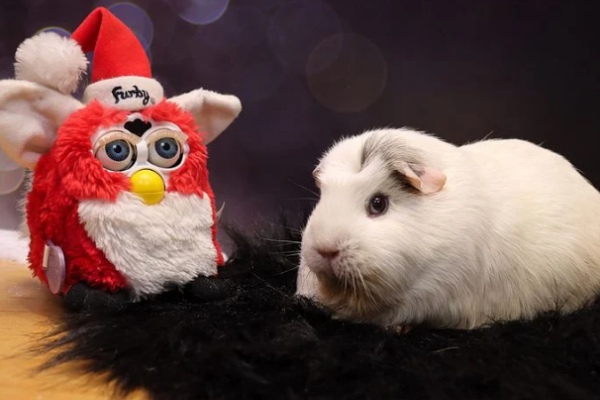What Can Guinea Pigs Not Eat [14 Unsafe Foods]
![What Can Guinea Pigs Not Eat [14 Unsafe Foods] What Can Guinea Pigs Not Eat](https://petcreeks.com/wp-content/uploads/2022/04/What-Can-Guinea-Pigs-Not-Eat.jpg)
What can guinea pigs not eat? Let’s find out together…
Are you a guinea pig owner? Do you want to make sure your little furry friend stays healthy and happy?
Well, did you know that feeding your guinea pig the wrong foods can cause serious health problems?
In this blog post, we’ll go over some of the foods that guinea pigs should not eat, so you can keep them safe and healthy.
Trust us, your little piggy will thank you for it!
Signs a guinea is eating the wrong foods
There are several possible signs that a guinea pig is eating the wrong foods.
One of the most common signs is digestive problems, such as diarrhea or constipation.
If a guinea pig is eating foods that are too high in sugar or fat, it can also lead to obesity or other health problems.
Other signs that a guinea pig may be eating the wrong foods include changes in behavior or appetite, such as refusing to eat or eating less than normal, or changes in the appearance of the fur or skin.
If you suspect that your guinea pig is eating the wrong foods, it’s important to consult with a veterinarian who specializes in small animals so they can evaluate your guinea pig’s health and recommend appropriate treatment.
What Can Guinea Pigs Not Eat
Here are some common foods a guinea pig shouldn’t eat:
1. Avocado
Persin, a component of avocado, can impair guinea pigs’ ability to breathe, harm their hearts, and even kill them.
Although persin is toxic to a wide variety of animals, including dogs and birds, guinea pigs are especially vulnerable due to their delicate respiratory systems.
2. Chocolate
Theobromine, a substance found in chocolate, is poisonous to guinea pigs.
Seizures, hyperactivity, and potentially fatal cardiac arrhythmias can all be brought on by a large intake of theobromine.
Additionally, chocolate has high levels of sugar and fat, which can make guinea pigs obese and develop dental issues.
3. Raw Potatoes
Due to their high starch and carbohydrate content, potatoes might upset guinea pigs’ digestive systems.
They may also include solanine, a poison that can make people feel lethargic, throw up, and have diarrhea.
It is advised to avoid giving guinea pigs any potato products because solanine is mostly found in the potato peel and green portions of the potato.
4. Dairy products
Due to their inability to digest lactose, a sugar present in milk and other dairy products, guinea pigs are lactose intolerant.
Dairy products can give them stomach aches, bloating, and diarrhea.
Additionally, high in fat and calories, dairy products can contribute to obesity and other health issues.
5. Onions and Garlic
Thiosulphate-containing substances found in onions and garlic can harm red blood cells and result in anemia in guinea pigs.
Lethargy, weakness, and even mortality can result from anemia.
In guinea pigs, onions and garlic can also lead to digestive issues and poor breath.
6. Iceberg lettuce
While guinea pigs can safely eat a variety of leafy greens, iceberg lettuce should not be consumed.
Lactucarium, a compound found in iceberg lettuce, can make guinea pigs bloated and diarrhoeal.
Additionally, it has poor nutritional value and, when served in excessive quantities, might lead to weight gain.
7. Rhubarb
Oxalic acid, which is present in rhubarb, can harm guinea pigs’ kidneys if taken in large doses.
Oxalic acid can result in kidney stones and hinder the absorption of calcium, which can result in brittle bones and teeth.
Since guinea pigs can become ill from even little doses of rhubarb, it should be completely avoided.
8. Nuts and seeds
Nuts and seeds are heavy in fat and can upset guinea pigs’ digestive systems.
They can pose a risk of choking, particularly for young guinea pigs.
It is advised to stay away from giving guinea pigs nuts and seeds as they can cause obesity and other health issues.
9. Citrus fruits
Guinea pigs require vitamin C, but their delicate digestive systems cannot handle the acidity of citrus fruits like lemons.
Citrus fruits can lead to digestive issues like diarrhea and bloating, as well as mouth ulcers, tooth decay, and gum disease.
Keep to other vitamin C sources like bell peppers and kale for the best results.
10. Tomato Leaves
Solanine, a poisonous substance also present in potatoes, is present in the leaves and stems of tomatoes.
Guinea pigs can consume ripe tomatoes in moderation without any problems, but they shouldn’t consume the leaves or stems.
11. Junk Food and Processed Foods
Foods like chips, cookies, or fast food should not be given to guinea pigs.
These foods are heavy in sugar, salt, and fat and can make guinea pigs obese and lead to dental disorders and other health concerns.
A diet rich in hay, fresh produce, and pellets created especially for guinea pigs’ nutritional requirements should be fed to them.
12. Seeds from Apples, Pears, and Other Fruits
Guinea pigs can become poisoned by the minuscule amounts of cyanide found in the seeds of some fruits, including apples, pears, and other fruits.
Fruit flesh in tiny amounts can be given as a reward, but the seeds should always be removed.
13. Salty Foods
Salty foods like pretzels, chips, or crackers shouldn’t be given to guinea pigs.
In guinea pigs, these diets can lead to dehydration, kidney difficulties, and other health concerns.
To suit their nutritional needs, guinea pigs should instead be fed fresh vegetables and hay.
14. Dried Fruit
Dried fruit contains a lot of sugar and can harm guinea pigs’ teeth and digestive systems.
Given that it has more water and fiber, fresh fruit is preferable for guinea pigs.
Learn more about all the fruits and vegetables guinea pigs can eat.
Dangers of giving guinea pigs the wrong foods
Although guinea pigs can consume a range of meals, it is crucial to give them the proper ratio of nutrients to maintain their health.
The incorrect feeding of guinea pigs can result in a number of health issues, some of which can be fatal.
Below are some common dangers of giving guinea pigs the wrong foods:
- Gastrointestinal problems: Guinea pigs have a sensitive digestive system, so feeding them the wrong foods can upset their stomachs and cause gastrointestinal problems like diarrhea, bloating, and constipation.
- Tooth problems: Guinea pigs’ teeth never stop growing, and they require a diet rich in fiber to keep them from getting too long. Feeding guinea pigs the wrong foods can lead to tooth problems like overgrown teeth or tooth decay.
- Vitamin deficiencies: Guinea pigs require a diet rich in vitamin C, as they cannot produce this vitamin on their own. Feeding them a diet lacking in vitamin C can lead to a deficiency, causing symptoms like weight loss, lethargy, and rough coat.
- Obesity: Feeding guinea pigs too many high-calorie treats like fruits or vegetables can lead to obesity, which can cause a wide range of health problems including joint pain and respiratory problems.
- Urinary tract infections: Feeding guinea pigs a diet high in calcium can lead to the development of bladder stones or urinary tract infections.
- Liver problems: Some foods like chocolate or avocado contain compounds that can be toxic to guinea pigs and result in liver problems.
- Diabetes: Feeding guinea pigs too many high-sugar treats can result in diabetes or other blood sugar imbalances.
- Malnutrition: Feeding a guinea pig an unbalanced diet that lacks the necessary nutrients can lead to malnutrition, which can cause a wide range of health problems.
- Allergic reactions: Some guinea pigs may have allergies to certain foods, which can cause symptoms like itching, swelling, and difficulty breathing.
Conclusion
In conclusion, guinea pigs are adorable and make great pets, but it’s important to remember that they have sensitive digestive systems.
Knowing what not to feed them is just as important as knowing what guinea pigs can eat.
Avoid feeding them anything high in sugar, fat, or oxalic acid, and always introduce new foods slowly to avoid upsetting their stomachs.

![Can Guinea Pigs Eat Oranges [How To Feed] Can Guinea Pigs Eat Oranges](https://petcreeks.com/wp-content/uploads/2022/04/Can-Guinea-Pigs-Eat-Oranges-768x614.jpg)

![Can Guinea Pigs Eat Tomatoes [Pros & Cons] can guinea pigs eat tomatoes](https://petcreeks.com/wp-content/uploads/2022/04/can-guinea-pigs-eat-tomatoes.jpg)
![Can Guinea Pigs Eat Bananas [Helpful Tips] Can Guinea Pigs Eat Bananas](https://petcreeks.com/wp-content/uploads/2022/04/Can-Guinea-Pigs-Eat-Bananas-768x614.jpg)

![Can Guinea Pigs Eat Watermelon [Answered] can guinea pigs eat watermelon](https://petcreeks.com/wp-content/uploads/2022/04/can-guinea-pigs-eat-watermelon.jpg)